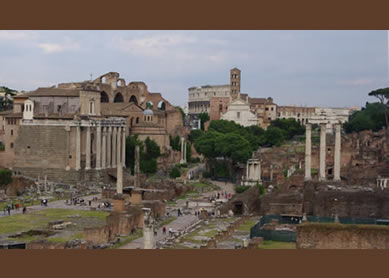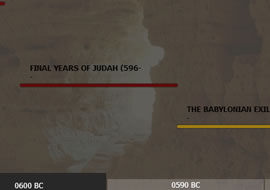Anti-Jewish currents were prevalent in antiquity, and these ideas, transmitted in texts over several centuries, point to strained relations between Jews and non-Jews around the Mediterranean world. In the third century B.C.E., for instance, the Egyptian priest and historiographer Manetho wrote of the “impiety,” “misanthropy,” and “xenophobia” of the Jews in a way that distinguished them from other ethnic groups. The pogrom in Alexandria in 38 C.E. also affected the province of Syria, which included the city of Antioch, now a part of Turkey. Between 38 C.E. and the first Jewish War and fall of Jerusalem (66-70 C.E.), the Jewish community in Antioch, which had a long history in the city, seems to have enjoyed a period of relative tranquility.
With the outbreak of the first Jewish War, underlying anti-Jewish sentiments came to the surface, and the Jewish population in Antioch suffered deadly persecution from the non-Jewish population. The latter demanded that the permission for Jews to abstain from participation in the Greco-Roman cult—granted by rulers for decades—should be revoked. Had Roman troops not intervened to preserve the peace, the situation would have been even more devastating.
After the end of the war, Jews across the Syrian province suffered reprisals from the Roman victors. Jewish captives were showcased at various events, and the Romans undertook other degrading actions: outside Antioch the Roman general Titus set up winged bronze figures supposedly from the temple, and a theater was built from spoils of the temple on the site of a synagogue. The emperor Vespasian also imposed a Jewish temple tax, the so-called fiscus Judaicus, and used it to rebuild the temple Capitoline Jupiter in Rome.
As humiliating as these actions were, they were not directed exclusively against Jews. This was the normal way that the Romans treated conquered peoples. In fact, the Jewish historian Josephus wrote that when the non-Jewish population in Antioch petitioned Titus to drive the Jews out of the city, or at least strip them of their rights, the general departed and left the status of the Jews unchanged (Jewish War 7.102-111). Riots and civic unrest were not in the interest of Rome. But the fact that the Roman authorities protected the Jews from open attacks from the non-Jewish population increased the interethnic tension, in all likelihood also affecting the relations between Jews and non-Jews within the Jesus movement.
One expression of this tension was the harsh statements of Ignatius, the bishop in Antioch during the early second century C.E. In letters to several Christian communities, Ignatius refers to Jews and Judaism in a clearly derogatory way, in one instance stating that it is “monstrous to talk of Jesus Christ and to practice Judaism” (To the Magnesians 10:3).
There is some evidence of interaction with Christians in the fourth century C.E., but otherwise very little is known of the Jewish community in Antioch during the subsequent centuries. Nevertheless, there are reasons to believe that the community never regained the splendor it had in the period before the first Jewish War.
Bibliography
- Kondoleon, C. Antioch: The Lost Ancient City. Princeton, N.J.: Princeton University Press, 2000.
- Zetterholm, M. The Formation of Christianity in Antioch: A Social-Scientific Approach to the Separation between Judaism and Christianity. London: Routledge, 2003.
- Downey, G. A History of Antioch in Syria from Seleucus to the Arab Conquest. Princeton, N.J.: Princeton University Press, 1961.
- Kraeling, C. H. “The Jewish Community at Antioch.” Journal of Biblical Literature 51 (1932): 130–160.




